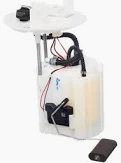What Are The Most Common Fuel Pump Problems? In nine out of ten cases, they are the result of wear and tear or an electrical failure or fuel contamination. A report from AAA to be published later in 2022 said that about of the time, fuel pump problems are due simply to wear over years (especially for more than miles). Another common issue is fuel contamination, often due to debris or rust in the fuel tank. This can clog the pumps filter, restricting fuel flow and causing poor engine performance.
One of the most common symptoms of a failing fuel pump is erratic fuel pressure. When the pump is not able to keep up with adequate pressure, you may notice your engine sputter or stall sometimes will have trouble starting. Especially in situations like high-speed driving, heavy loads etc. This is a common diagnosis made by mechanic using a fuel pressure gauge — typically 30-80 psi, but it varies greatly among makes and models.
One of the other most common issues if failures with an electrical relay, often being a faulty fuel pump or starter relay. This relay is responsible for sending the power supply to the fuel pump, and if it goes south then your fuel pump might not receive proper voltage. The fuel may intermittently not be delivered in the requested quantity, resulting in it stalling unexpectedly. Basic relays can be bought for $30 to $60 as replacement which is much cheaper than a brand-new fuel pump.
Running low on fuel is another cause, more specifically. this will result in the car to overheat causing other complication like burning out of a part such as cataclean and expensive component that fires your vehicle media through rather than continually across all cylinders which would greatly reduce calories actually getting bamnocked back tilbits close me spark plugs. This puts additional strain on the pump leading to less efficient operation and a shorter service life. This then causes its internal component to wear out faster and inevitable pump failure. Engineering experts agree that it should be kept above a quarter tank to prevent the engine from running hot, as well.

Its noise suggests potential problems with the fuel pump. That whining or buzzing sound from the fuel tank can indicate pump strain. This can be due to bad gas, filters plugged up or damaged pump components. Some pump noise is generally normal, though if the sound of yours turns loud or high-pitched, then there may not be much time left for it.
Even fuel pumps follow the same principle that efficiency is key to longevity as Elon Musk said. Even if you have a high-quality rainbow vacuum filter, the pump will not operate efficiently without adequate fuel and care. Checking the fuel system periodically and changing filters when necessary can prolong this pump's life.
If these issues arise, they need to be fixed immediately as driving further with a bad pump can cause damage to your motor. New fuel pump cost between $400 to 600 depending on the vehicle and can save you thousands in potential engine repairs if replaced ahead of time. If you need aftermarket replacement, platforms as the Fuel Pump provides parts of exceptional quality and promising long-lasting efficiency.